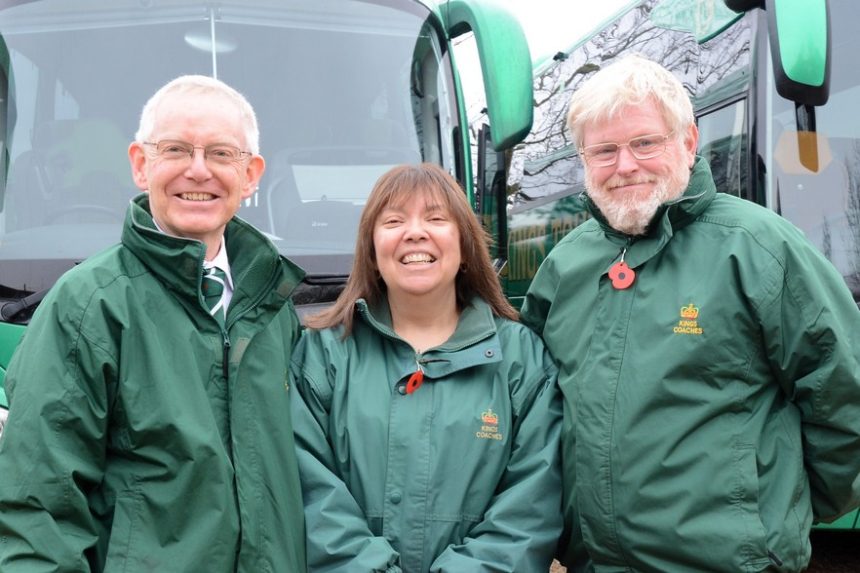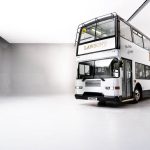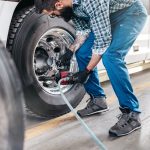Having recently celebrated its 70th anniversary, Kings Coaches is clearly adept at meeting industry challenges. But as the company looks ahead, significant growth isn’t on the agenda, and there’s a very good reason why
Family-run coach operators, especially those with a lengthy pedigree, can usually point to a traditional line of succession. Current owners will have taken over the business from their parents, who in turn will have taken over the business from their parents.
But in the Essex village of Stanway, near Colchester, the story of Kings Coaches has a slight twist.
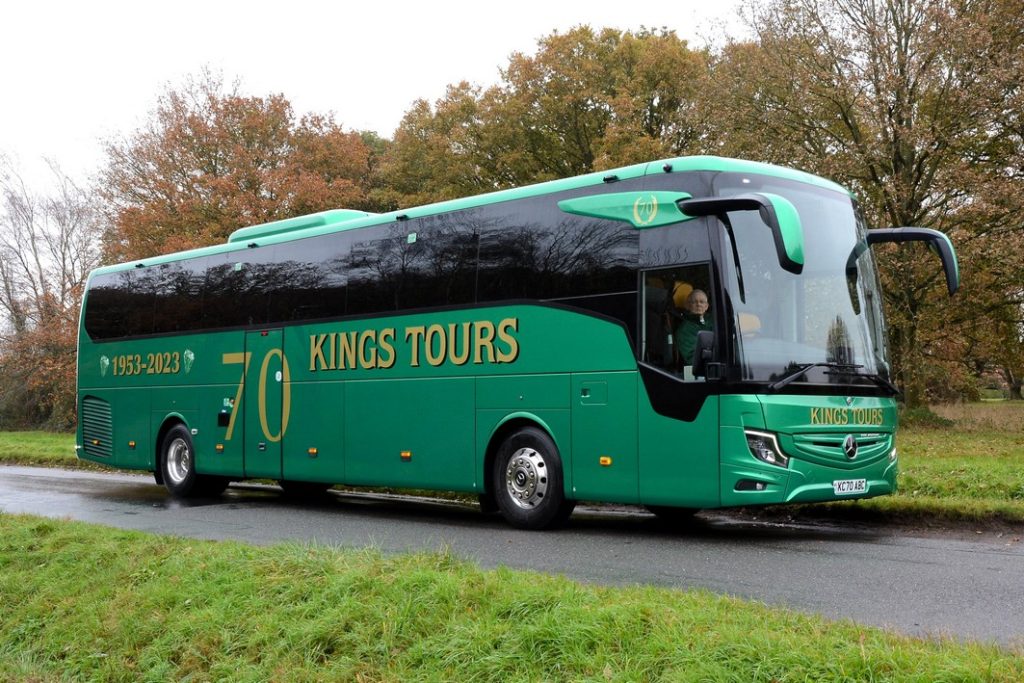
Andrew Cousins, the proprietor of the business today, explains the background.
“My grandfather, Frank King, established the business in 1953, together with his wife Queenie,” he says. “At the time Frank, age 48, was a salesman with Burdell’s Gravy Salt, a popular product of the time. He was also a keen member of his local methodist church.
Very much as a hobby he decided to buy a coach to carry people on short trips. That vehicle was GEL 501, a 1946, 29-seat Bedford OB with Duple bodywork.
“Frank and Queenie were at the heart of the Stanway village community, running the local sub-post office. All was going well, but then in the mid-1950s Frank had a serious car accident. It left him with a bad leg and brought an end to his days as a salesman. He realised that with all his contacts in the village and surrounding area there was an opportunity to develop the coach business.”
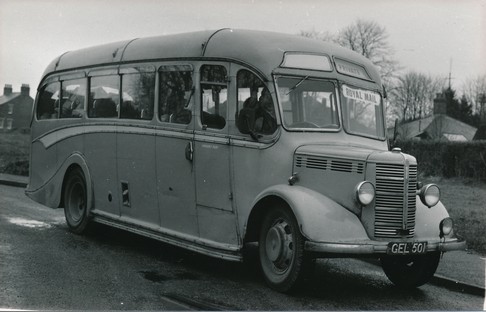
The jump in succession
Andrew recalls that the early work was all private hire, with Frank driving the Bedford, and Queenie at home sorting out all the administration. In June 1958, Kings was awarded a school contract, prompting Frank to acquire a second coach, another 29-seat Bedford OB, registration KEL 95. Over the following years Frank stayed with Bedfords, increasing the fleet to three in 1966 and then four at the end of the decade.
But this is where the story of succession takes its twist. Frank and Queenie’s son-in-law, Eric (Andrew’s father), wasn’t interested in the coach business at all.
“Eric was in the building trade,” explains Andrew. “So there wasn’t the usual father and son handover. It was Frank and Queenie who continued, keeping everything going. In later years Eric’s wife, Anne, my mother, did the payroll. I remember cleaning the coaches when I came home from school and at weekends. At the time I wanted to be an airline pilot and I left university in 1980 still with that ambition. Sadly, things didn’t go the way I’d hoped. As a result I found myself getting more and more involved in Kings Coaches. Looking back it seemed the natural thing to do. My parents were very supportive and my grandparents were very pleased to have me involved.”
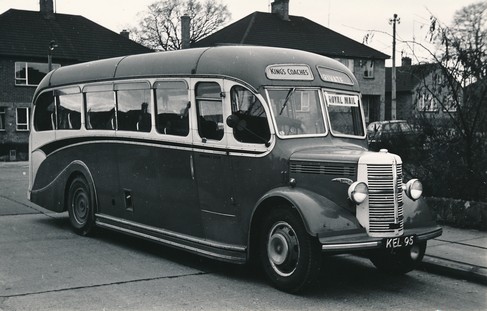
Competition leaves its mark
By 1980 the fleet stood at five vehicles. In the April, Frank had acquired his first full-size coach, a 1971 Ford R226 with Duple Viceroy 53-seat bodywork (TMJ 655K). Andrew had taken his PCV test earlier in the year and in the August, with Frank now 75, Andrew joined him in a partnership.
“I was learning the business quickly and I suppose you could say we were both running it,” says Andrew. “But competition for school contracts was becoming more cutthroat and we found ourselves losing work. However, that meant we could take more private hire work from the WI and other local groups.”
In 1984 Kings operated its first publicly advertised tour, a 10-day holiday to Dunoon in Scotland, a destination that’s remained in the programme for 40 years. But touring highlighted the unsuitability of the coaches in the fleet.
“We needed a heavyweight coach,” says Andrew. “We initially (1986) turned to Alan Smiles at Kirby Central in South Yorkshire for an ex-Wallace Arnold Setra S215HU before returning to Cyril Kenzie, of Shepreth, Cambridgeshire for a 1983 Volvo B10M with Plaxton Paramount bodywork, having acquired a Bedford YMT from him in 1983. In 1996 we gained a contract with a local tour operator and subsequently (1997) bought our first new coach, a Bova Futura from Moseley at Pontefract.”
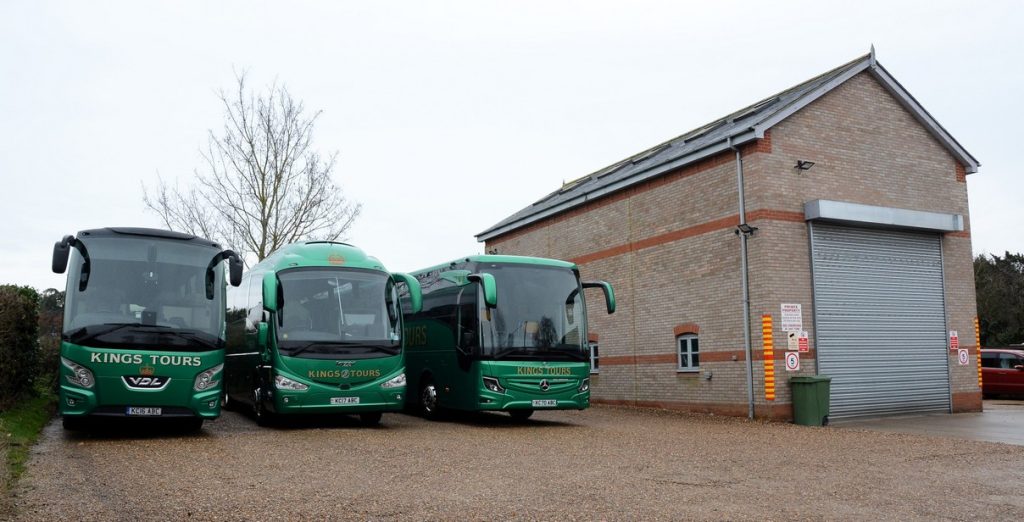
Andrew takes the reins
In 1994, with Frank ailing, Andrew became sole proprietor. Frank died in 1996 having seen the business prosper and the fleet grow to seven. Andrew started to buy a new vehicle each year, building the quality.
“Over the years we built up a good relationship with Moseley,” explains Andrew. “Our first coach from there (1987) had been a 1982 Plaxton-bodied DAF MB200. It was a long and good association. We bought Bovas from 1997 to 2010, including our first tri-axle, a Bova Magiq in 2008.”
Throughout this period the company had been working out of a little office on the present site in the centre of the village. Next door was a pre-1900 stable block. In 1998, with help from Andrew’s father, Eric, and his involvement in the building trade, the stable block was sympathetically converted into offices and the single bay workshop that now sits at the edge of the yard was completed.
“Seven is the right number of vehicles for the size of the yard,” he explains. “I aim to buy a new coach each year. The yard does limit any significant growth but I’m happy with the size of the business as it is.”
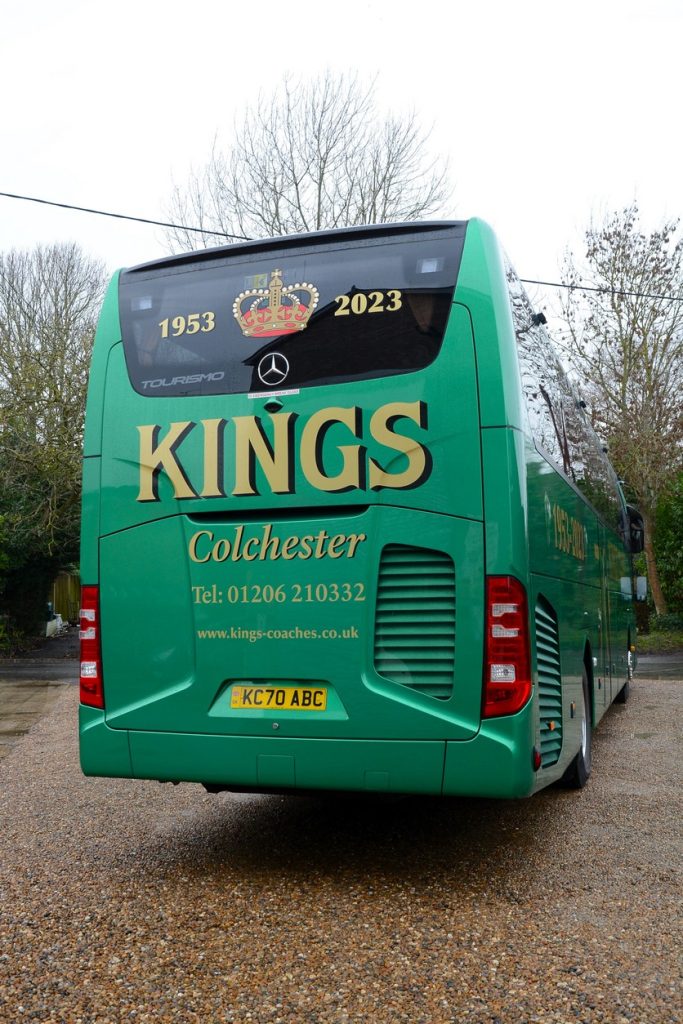
A coach to fit the workshop
The fleet profile has moved around a bit over recent years, from a Van Hool Astron tri-axle in 2011 through to a VDL Futura 2 in 2015 and 2016. A 34-seat Irizar i6 Integral in 2017 led to a full-size i6 Integral in 2018.
“But then I wanted a two-axle, 13.2m coach because the legroom is better suited to our requirements,” explains Andrew. “The equivalent Irizar was 12.9m. As a result I bought a 19-plate Mercedes-Benz Tourismo through EvoBus. I liked the Tourismo and ordered a 20-plate, 13.95m tri-axle. The equivalent Irizar was 14.05m and slightly too long to fit in our workshop. I was also ready to sign a lease on a second vehicle. Then COVID-19 struck. Fortunately I hadn’t signed or paid and I was able to stop the arrangements. EvoBus was very good, keeping the same deals in place until I was ready. I took the 20-plate in September 2021 and the second vehicle on lease in May 2022. The newest coach is a 73-plate Tourismo, with private 70-plate to reflect the anniversary. Another Tourismo is due next year. Looking back, if lockdown had happened just a month later it could have been the end of the company!”
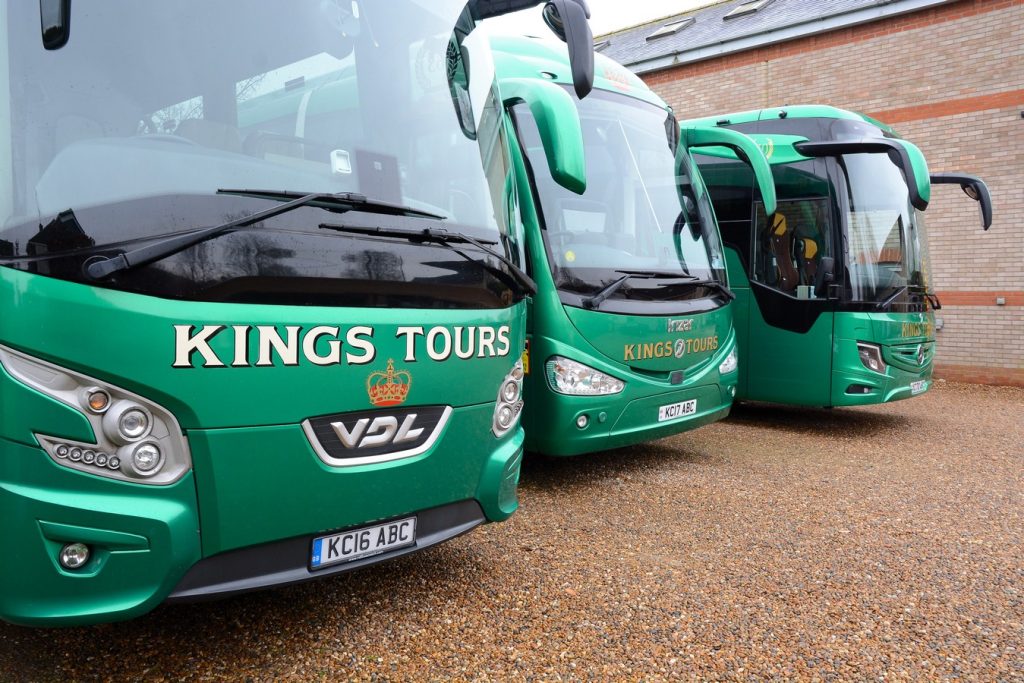
Well received brochure
Today, Kings Coaches operates between 12 and 14 tours a year, mostly domestic, and most being five-night duration. A small day trip programme operates around nine departures a month. The tours and day trips are marketed under the Kings Tours branding with vehicle livery reflecting the same branding.
“Our 2024 holiday tour brochure has been well received, in spite of some significant price rises,” explains Andrew. “We launched the brochure on 10 November and by the end of the third day we were 75% sold.”
Andrew has a wealth of experience supporting him in running the business. Transport Manager Andy Moules has been with the company since 1994. Kim Holden is Office Manager having joined in 1998. Making up the team is Chris Hopping, Fleet Engineer, and around 16 full-time and part-time drivers.
“We’ve been fortunate with our drivers,” says Andrew. “We lost a couple during the pandemic but compared to many operators we were lucky. We find we don’t need to advertise though. Drivers come to us through recommendations.”
So how does Andrew see the future?
“This is in my blood,” he says. “Business is made by the people, and in this team we have the very best. We’re all family in the widest sense, and I like the fact that we make it possible for passengers to build friendships. We’ve always adapted to industry challenges, and we always will. But one aspect is really important. I wouldn’t have been able to build this all up without the work my grandfather did!”




















